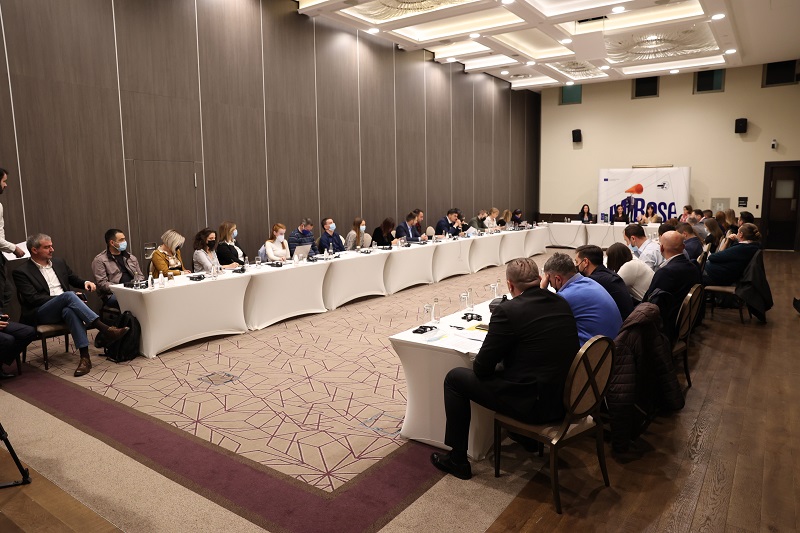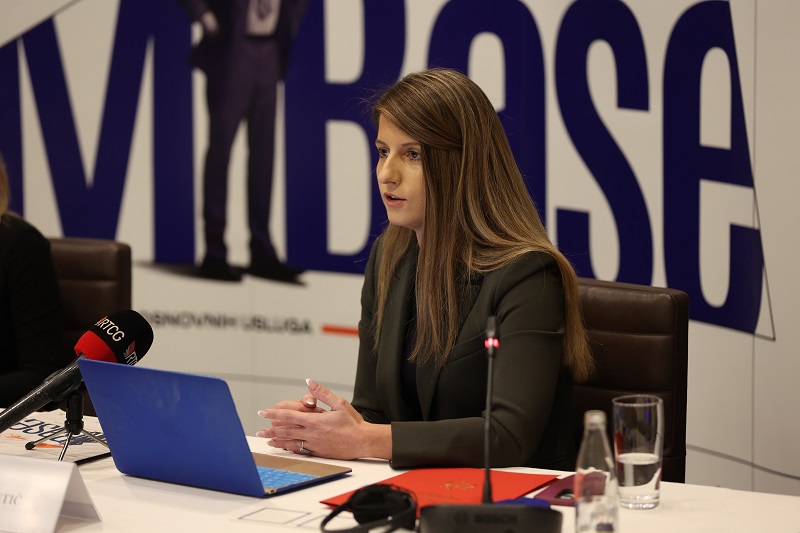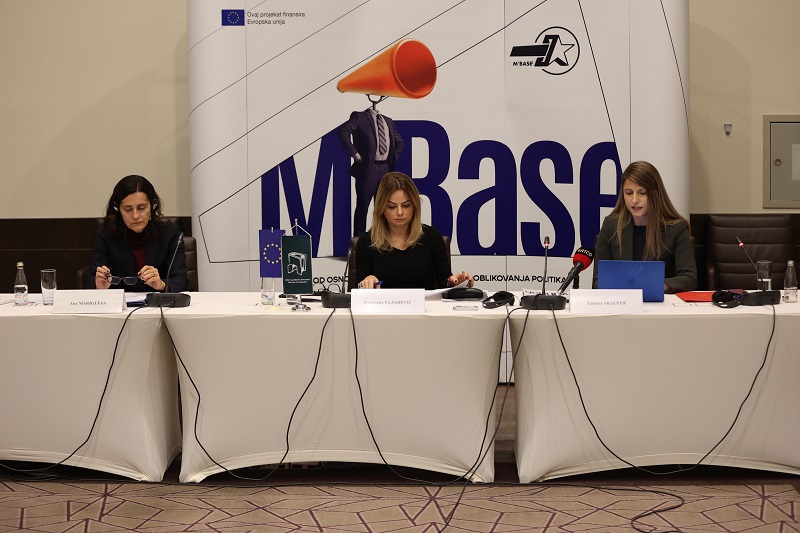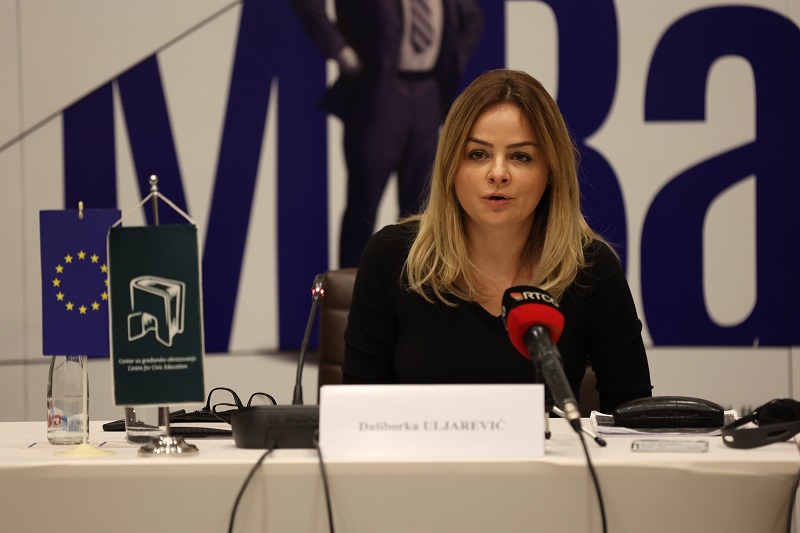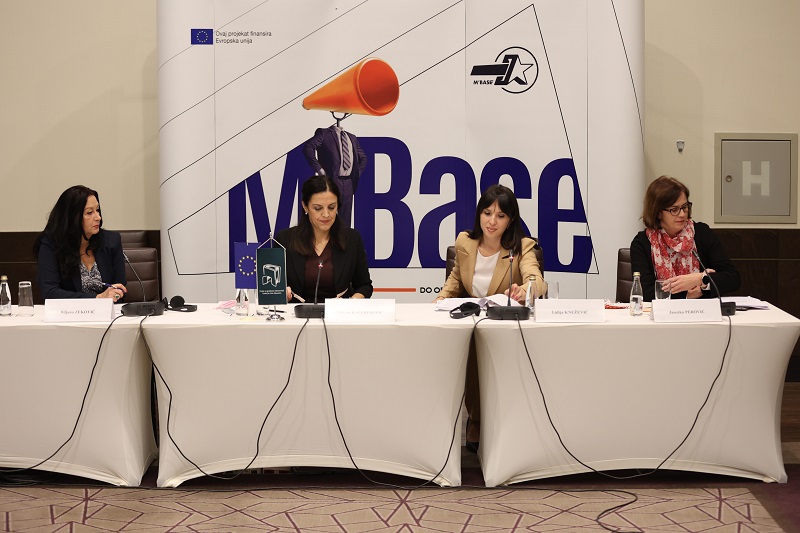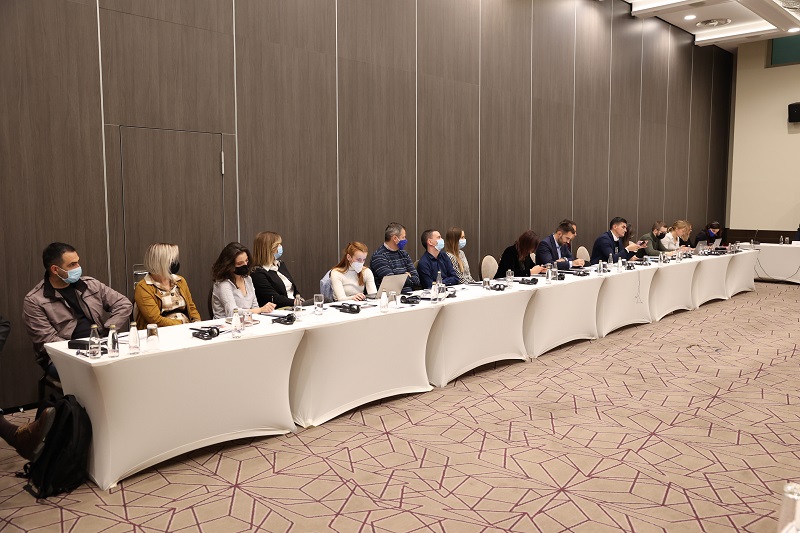Cooperation between the Government and NGOs is not good and efforts of all stakeholders are needed to make it functional and mutually beneficial, it was assessed today in the first part of the discussion forum “CSOs and Authorities – which road to the cooperation in building open society?“, organised by the Centre for Civic Education (CCE), in cooperation with partners, and with the support of the EU Delegation to Montenegro and co-financing from the Ministry of Public Administration, Digital Society and Media.
Tamara Srzentić, Minister of Public Administration, Digital Society and Media, stated that after a year that she spent in Montenegro, facing challenges daily, she would always choose to partner with the civil sector as an inexhaustible source of knowledge and expertise. “Montenegro does not have better representatives than those from the civil sector, who so strongly, clearly and constructively, continuously point out and remind of problems and propose solutions. You are proven partners of the Government of Montenegro, and that is why our cooperation and communication should be constantly improved and strengthened,” she stated. Srzentic also mentioned that this is precisely the right moment for that, due to the open issues that burden the civil sector, especially in the part of financing NGOs and the allocation of funds from the budget, as well as work on strategic documents of interest to NGOs. She informed that the Ministry has prepared a draft Strategy for the cooperation of state administration bodies and NGOs, as well as an accompanying Action Plan. “We have set strategic goals, improvement of the existing normative and strategic framework for the development of effective participation of NGOs in the creation and preparation of public policies and strengthening the NGO sector as one of the partners of the state. We want to ensure a long-term reliable and quality partnership in order to have quality public policies, and to provide our citizens quality and affordable services,” explained Srzentić. Minister Srzentić stated that the preparation of the Information on the implementation of the Law on Non-Governmental Organizations is in the final phase and that, based on the recommendations from that Information, amendments to the Law on NGOs will be introduced. “Changing the norms in the part of financing NGOs from the budget will not be without prior consultations with you. I would like you to know that our teams are working hard to prepare all the details, and will be in regular contact with you in the coming weeks to share our plans,” Srzentić promised to the present NGO representatives.
Ana Mariguesa, Attaché and Programme Manager for Civil Society at the EU Delegation to Montenegro, reminded that the Government’s cooperation with civil society is an integral part of the European integration process. “Although CSOs in Montenegro participate in working groups, their inclusion in practice is not enough nor consistent. In order to establish effective participation in the dialogue, a balanced approach, better planning and transparency are necessary,” she said. Mariguesa also underlined the need to strengthen cooperation between CSOs and local authorities. “The local level is extremely important in the reform processes, and CSOs from all parts of the country should be involved so that citizens have a voice in these processes,” she elaborated. Mariguesa reflected on the findings from the EC Report on Montrengro for 2021, especially the part that stressed the need to strengthen mechanisms of consultations and cooperation with NGOs, certainty and reliability of funding NGOs from public funds and improvement of the normative framework. “Efforts are needed on both sides to establish a mutually beneficial dialogue. The Government must accept that CSOs have a role to play and that they are a bridge between the administration and the citizens, and be open to recommendations and comments from competent CSO representatives. On the other hand, CSOs should approach the work of the bodies in which they participate in a constructive and productive way to achieve synergy. The participation of civil society in European integration makes this process more transparent and efficient, and let’s not forget that European integration implies deep and broad social changes, and that is why civil society must have its role in it,” Mariguesa assessed.
Daliborka Uljarević, Executive director of the CCE, assessed that the changes in the political field did not bring the expected breadth and that there are no indicators of achievement when it comes to the promises of the Prime Minister Zdravko Krivokapić to the civil sector. She characterized the messages of Minister Srzentic as a minority expression in relation to the dominant narrative and approach of the members of the Government. “It seems to me that there is a big gap in the understanding of the concepts of cooperation, openness, transparency, and many others by NGOs and the Government. For example, instead of the promised cooperation with civil society in the implementation of public benefit projects, we have a situation where the Government has not even fulfilled the legal obligations to support CSOs, and a huge number of NGOs that provide valuable services, but also those for which international funds are not available, did not receuve the funding as the calls for funding have dominantly been announced in the fourth quarter, and with that the Government practically annulled this year for the NGOs. We also see that with the planned budget we are going back almost two terms of the Government, because the funds for NGOs are decreased by app. 60%, which is a return to the level from 2015/2016. This banking approach of those who create budget towards NGOs is not a good message,” Uljarević emphasized. She criticized the Government for insufficient proactivity in protecting freedom of speech and personal dignity of critically oriented NGOs, especially when they were attacked by government representatives. Uljarević also reminded that the promise of the Prime Minister on the availability of information and condemnation of all abuses before the public court was not fulfilled, and expressed the expectation that the discussion would lead to certain recommendations for establishing constructive cooperation to improve the environment for civil sector work and development. Furthermore, she pointed out that today Montenegro does not have a Council for Cooperation between the Government and NGOs, as well as that there are no representatives of NGOs in the Rule of Law Council, although the previous Government included them near the end of its mandate.
Lidija Knežević, programme director of Centre for development of Non-governmental organizations and member of the WG for drafting the Information on the implementation of the Law on NGOs, expressed serious concern about the manner of implementation of the Law on NGOs and violations of this regulation in financing projects and programmes of NGOs. “This Government continues the practice of the previous ones in delaying and neglecting the obligations arising from the Law on NGOs in this area. No call for allocation of funds was announced within the legally prescribed deadline. This delay does not only jeopardize the implementation of funding for NGO projects and programmes, but also the implementation of public policies (laws, strategies, action plans, etc.) in priority areas, with which supported projects must be linked. Although the new manner of financing was supposed to directly connect the priorities of the Government with the projects of non-governmental organizations, this practice makes the whole concept of financing NGO programmes and projects completely meaningless. We are in the second half of November, and no ministry has made a decision on the allocation of funds. This practically means that the projects and public policies related to them will be implemented during the next year, which is contrary to the legally established concept of financing NGO programmes and projects from the state budget,” she said. She also referred to the problematic intention of the Government to abolish the percentage budget allocation for NGO projects and programmes.
Jasenka Perović, manager of project “Technical Support to the Government for Strengthening Cooperation with Civil Society of Montenegro“, explained that this project, implemented by the international company Sofreko, will provide expert support in the process of strengthening the capacity of state administration bodies for more efficient consultation and cooperation with civil society organizations in order to create sectoral policies and implement legal frameworks and strategies that affect the functioning of civil society. “Moreover, the project will work on improving the role of the Council for Cooperation between state administration bodies and NGOs, then on improving the government’s financial support to civil society organizations. Particular focus will be on improving transparency, monitoring, measuring performance and reporting on the performance and usefulness of publicly funded projects implemented by CSOs. Finally, the project will strengthen domestic administrative structures to prepare Montenegro for the management of EU funds in the future,” she elaborated. Perović also spoke about the process of consultations with the NGO sector and other actors during the development of the new Strategy for Cooperation between Public Administration and NGOs for the period 2022-2026.
Biljana Zeković, Executive Director of the SOS Hotline for Women and Children Victims of Violence Podgorica, thinks that the new governing structure must hear what non-governmental organizations are doing, what are their inherent values and what results they are achieving. “When we talk about the environment for the work of NGOs, it is difficult to assess how stimulating that environment is, but the NGO sector is strong. All that we are doing jobs that one state apparatus cannot deal with on its own, and this has a direct impact on the development of democracy in Montenegro,” she said. Zeković stated that there is not enough transparency in the calls to NGOs to work on sectoral analyzes. “Institutional mechanisms must exist to create a supportive environment, and an integral part of that is related to funding, and until that is regulated, we cannot talk about improved conditions for cooperation,” she concluded. She also referred to the problem of assessors within project evaluation for financial support from public funds.
During the discussion, Mišo Pejković from CAZAS assessed that the change of the existing Law on NGOs is urgently needed in the part of the models of financing of NGOs, pointing out the problems with assessors, as well as the need for specialization of NGOs.
Mimo Korać, from the Association of Parents of Children and Youth with Developmental Disabilities, considers that there is a lack of Government sensitivity towards NGOs. In his opinion, one of the key problems is the implementation of a normative framework to the detriment of NGOs. He particularly referred to the poor position of organizations of persons with disabilities due to delays in budget allocations for NGOs, the lack of responsibility for the consequences of these delays, and the closeness of many ministries.
Stevo Muk from the Institute Alternative stated that, according to the data of that organization, in the last seven years, around 30 million euros have been distributed to NGOs from the budget, and that there is no evaluation of these projects. He believes that a fair assessment would help those who work the most in the NGO sector, because it would shed light on who is acting responsibly towards these funds and who is not doing that. He is also of the opinion that a centralised portal for reporting on all projects should be established to ensure full transparency of this process.
The forum aims to contribute to strengthening the dialogue between institutions and civil society, exchange of views and opening a space for constructive cooperation to improve the environment for work and development of the civil sector. This is one of the activities of the project “CSOs in Montenegro – from basic services to policy shaping – M’BASE“, implemented by the CCE in partnership with the German Friedrich Ebert Stiftung (FES), the Center for Protection and Research of Birds of Montenegro (CZIP) and Politikon Network, in cooperation with the Ministry of Public Administration, Digital Society and Media and the European Integration Office of the Government of Montenegro. The project has EU financial support and co-financing from the Ministry of Public Administration, Digital Society and Media.
In accordance with the limitations of COVID-19 pandemic, the forum brought together about 50 representatives of institutions, local governments, NGOs, media and political parties.
Maja Marinović, Programme Associate

